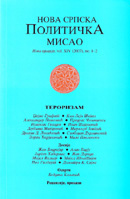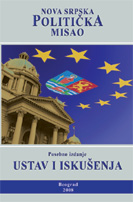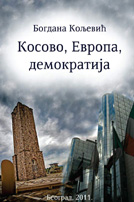| NSPM in English | |||
Delusions of war |
 |
 |
 |
| среда, 29. октобар 2008. | |
guardian.co.uk, Monday October 27 2008 During the 1990s, many one-time leftists in the west and elsewhere were drawn towards the idea that human rights could somehow fill the gap left by the decline in socialist politics. In the wake of the Bosnian bloodbath and the Rwandan genocide, that crystallised for some into support for unilateral humanitarian intervention and war. During the 1990s, many one-time leftists in the west and elsewhere were drawn towards the idea that human rights could somehow fill the gap left by the decline in socialist politics. In the wake of the Bosnian bloodbath and the Rwandan genocide, that crystallised for some into support for unilateral humanitarian intervention and war.
A decade on, the hopes that were invested in such delusions lie buried in the graveyards of Falluja and Kandahar, the ethnically cleansed Serb and Roma districts of Kosovo and the torture, kidnapping and internment jails run by the self-proclaimed liberators and human rights champions of the war on terror. Part working travelogue from almost every recent major conflict zone, part political journey and analysis, Foley's new book, The Thin Blue Line: How Humanitarianism Went to War, is an important and thoughtful contribution to understanding why western "humanitarian interventions" - from Somalia and Yugoslavia to Sierra Leone - have largely failed in their own terms and left such a dismal and unstable legacy. Foley is effective at deconstructing some of the mythology and deceit around these debacles - including the illegal Kosovo war of 1999, which paved the way for the aggression against Iraq, but is still seen as a But he is at his most insightful about the role played by the battalions of NGOs he has wrked among, which follow the conquering armies like missionaries, often urging them on and providing the social infrastructure for the bloated occupation regimes that are then imposed on hostile lands. As Foley highlights, most non-governmental organisations in the humanitarian line of work are no longer really NGOs at all - they're increasingly sub-contracted GOs, which get the bulk of their funding from western governments with political strings attached. Foley describes returning to Afghanistan in 2004 to find that "the humanitarian effort had become part of a wider counter-insurgency operation". The then US secretary of state Colin Powell hailed the humanitarian NGOs as "a force multiplier for us, such an important part of our combat team". Against such a background, it's hardly surprising that aid workers come to be seen as targets by some of those fighting occupation. Steeped as he is in NGO-speak and thinking, Foley can often lapse into loaded terminology and assumptions: he repeatedly uses the term "international community", for example, when he clearly means the US and its allies. In the same vein, he largely accepts the reasons given by the western powers for their interventions at face value, along with, say, the legitimacy of occupied Afghanistan's fraudulent elections, in which political parties weren't even allowed on the ballot paper. And so keen is Foley to dissociate himself from "anti-imperialists" that he reserves some of his sharpest - and least sure-footed - attacks for a writer such as Naomi Klein, over her analysis in The Shock Doctrine of disaster But in a sense that only strengthens the force of his critique, coming as it does from someone immersed in the ideology and practice of the "humanitarian community" - who has learned from personal experience how calamitous invading other people's countries in the name of democracy and human rights has proved on the ground. When he describes the role played by western governments and NGOs in Sierra Leone and Liberia as a deeply resented "recolonisation", you know it's not meant as a rhetorical flourish. |
Од истог аутора
Остали чланци у рубрици
- Playing With Fire in Ukraine
- Kosovo as a res extra commercium and the alchemy of colonization
- The Balkans XX years after NATO aggression: the case of the Republic of Srpska – past, present and future
- Из архиве - Remarks Before the Foreign Affairs Committee of the European Parliament
- Dysfunction in the Balkans - Can the Post-Yugoslav Settlement Survive?
- Serbia’s latest would-be savior is a modernizer, a strongman - or both
- Why the Ukraine Crisis Is the West’s Fault
- The Ghosts of World War I Circle over Ukraine
- Nato's action plan in Ukraine is right out of Dr Strangelove
- Why Yanukovych Said No to Europe

.jpg)





















